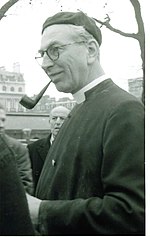John Collins (priest), Date of Birth, Date of Death
TweetJohn Collins (priest)
Anglican priest, born 1905
 Date of Birth: 23-Mar-1905
Date of Birth: 23-Mar-1905
Date of Death: 31-Dec-1982
Profession: priest, chairperson, activist
Nationality: United Kingdom
Zodiac Sign: Aries 
About John Collins (priest)
- Lewis John Collins (23 March 1905 – 31 December 1982) was an Anglican priest who was active in several radical political movements in the United Kingdom. Educated at Cranbrook School, Kent, and the University of Cambridge, Collins served as a chaplain in the Royal Air Force during World War II and was radicalised by the experience.
- In 1946, he founded the organization Christian Action to work for reconciliation with Germany.
- He was appointed as a canon of St Paul's Cathedral, London in 1948, an office he held for 33 years.
- Shortly afterwards he became disturbed by the newly developing apartheid system in South Africa. In 1951, Collins was one of the four founders of the charity War on Want which fights global poverty.
- In 1956, he committed Christian Action to raising funds for the defence of anti-apartheid activists accused of treason in South Africa and this gave rise to the Defence and Aid Fund for Southern Africa.
- The fund raised over £75,000 to help defend the accused during the Treason Trial. Collins was strongly opposed to the spread of nuclear weapons and was one of many on the left in Britain who believed that it was unnecessary and wrong for Britain to own such weapons.
- He was one of the founders of the Campaign for Nuclear Disarmament.
- He was also a member of the Anglican Pacifist Fellowship, working with the Reverend Sidney Hinkes on anti-nuclear campaigns. The Canon Collins Educational & Legal Assistance Trust, formerly known as Canon Collins Trust for Southern Africa (CCETSA) is a charity founded in 1981.
- It was set up as the Defence and Aid Fund for Southern Africa and Collins was its first chairman.
- In the days of apartheid it provided money to help South African and Namibian refugee students gain the higher education in the United Kingdom and in independent African states.
- It now provides scholarships for students within South Africa and in other African countries.
Read more at Wikipedia
See Also
- Famous People's Birthdays on 23 March, United Kingdom
- Famous People's Birthdays in March, United Kingdom
- Famous priest's Birthdays on 23 March, United Kingdom
- Famous priest's Birthdays in March, United Kingdom
- Famous chairperson's Birthdays on 23 March, United Kingdom
- Famous chairperson's Birthdays in March, United Kingdom
- Famous activist's Birthdays on 23 March, United Kingdom
- Famous activist's Birthdays in March, United Kingdom

